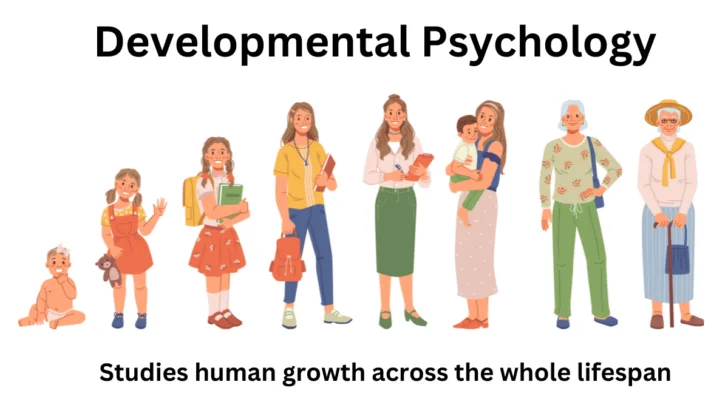Developmental psychology is a field that studies how people grow and change throughout the course of their lifespans. Development is about much more than the physical changes that occur over a lifetime. It also involves cognitive, social, and emotional changes at different ages.
This article discusses some of the major issues in developmental psychology and the historical origins of some of the best-known development theories. It also covers the goals and impact of developmental psychology.

What Is Developmental Psychology?
Developmental psychology focuses on studying how individuals change and develop throughout their lifespan. It examines the physical, cognitive, emotional, and social changes from infancy to age. Developmental psychologists seek to understand the processes and factors influencing human development, such as genetics, environment, culture, and individual experiences.
Key areas of interest within developmental psychology include:
Child Development
This area focuses on children’s physical, cognitive, and emotional development from infancy through adolescence. Researchers study topics like language acquisition, attachment, moral development, and the development of cognitive abilities.
Adolescent Development
Adolescence is a unique development period marked by physical changes, identity formation, and the development of independence. Researchers in this area examine issues like peer relationships, identity development, and risk-taking behavior.
Adult Development and Aging
This area explores how individuals change and adapt as they move through adulthood and into old age. Researchers study topics like cognitive aging, personality development, and the impact of life events on well-being.
Social and Emotional Development
This field focuses on how individuals develop social skills, emotions, and interpersonal relationships. It examines topics such as attachment theory, empathy, and social cognition.
Cognitive Development
Cognitive development refers to changes in thinking, problem-solving, and reasoning abilities across the lifespan. Researchers study cognitive processes like memory, problem-solving, and language development.
Developmental Disabilities
Some developmental psychologists specialize in studying and working with individuals with developmental disabilities, such as autism spectrum disorder or intellectual disabilities.
Developmental psychology is an interdisciplinary field that draws on research and theories from various domains, including biology, sociology, education, and neuroscience.
The ultimate goal of developmental psychology is to gain a deeper understanding of human growth and change processes, which can have practical applications in fields such as education, counseling, and healthcare.
Issues in Developmental Psychology
There have been several important debates and issues throughout the history of developmental psychology.
The three important developmental psychology issues focus on:
Continuity vs. Discontinuity
The continuity vs. discontinuity debate focuses on the processes through which development occurs, including whether development is a gradual process or occurs in a series of discrete stages.
Continuity suggests that development is a gradual process that takes place continually. On the other hand, discontinuity suggests that development follows a path that often involves abrupt changes during specific life stages.
Stage theories of development are examples of discontinuity. Such theories suggest that children go through the same developmental stages that follow a specific order and usually occur at certain ages.
Stability vs. Change
Stability vs. change refers to the overall importance of early experiences versus later events.
Psychologists have also debated whether certain characteristics, such as personality traits, are largely stable throughout life or whether they develop and change as a result of experience.
The stability approach suggests that many characteristics are present or established during early childhood. The change approach proposes that experiences, including interactions with peers and parents, play the most significant role in development.
Nature vs. Nurture
The classic issue in child development research is the nature vs. nurture debate. Sometimes referred to as the nativism versus empiricism debate, it centers on whether genetic inheritance plays a larger role in influencing development and behavior or whether the environment has a stronger effect.
The nature versus nurture debate is a classic question in psychology that centers on whether genetics or environment plays a greater role in different aspects of human development and behavior.
In the past, nativists have argued that development is controlled almost entirely by genetic inheritance. Due to our shared DNA, certain aspects of development tend to follow a fairly predictable pattern in terms of timing and outcome. The onset of puberty, for example, tends to occur roughly around the same age.
As you might have already guessed, however, environmental factors can also play a role in development.
While empiricists may have argued that development was largely the result of environmental influences, experts today recognize that nature and nurture both have an important role to play and that the interaction between the two forces is also important.
In the case of puberty, genetics plays an important role in determining when it begins, but environmental factors such as receiving adequate nutrition are also critical.
Most psychologists recognize that both elements play an essential role, but the debate continues over many developmental questions about topics ranging from academic aptitude to personality traits.
History of Developmental Psychology
You might be surprised to learn that child development was once a topic of little concern. For much of human history, children were simply viewed as miniature versions of adults. It was not until after the Industrial Revolution that researchers began to recognize and investigate childhood as a unique, distinct, and important period of life.
Perhaps not surprisingly, some of the major theories of development center on the development that occurs during childhood. This is, after all, the time when developmental changes occur most rapidly.
Early investigations into child development began during the late 1800s with the work of naturalist Charles Darwin and physiologist Wilhelm Preyer. It was not until the 20th century with the work of famed psychologist Jean Piaget that concentrated research into child development theories began in earnest.
Other researchers who contributed a great deal of research during this period included Jean Bowlby, Lev Vygotsky, and Erik Erikson.
Developmental Psychology Theories
The modern study of developmental psychology did not emerge until relatively recently in history to address various aspects of how people change and grow over time. Some of these theories focus on how personality develops while others are centered on the cognitive changes that occur over the course of childhood.
Freud’s Developmental Psychology Theory
Freud’s theory of psychosexual development was an early theory that focused on how personality develops during early childhood. Sigmund Freud believed that psychosexual energy became focused on various erogenous zones at different points of development.
He also suggested that failing successfully to address the primary crisis of each stage could lead to a psychological fixation at that point of development.
Erikson’s Developmental Psychology Theory
Erikson’s theory of psychosocial development was similar to Freud’s in that it broke development down into stages and involved a type of developmental crisis during each stage.
Erikson’s theory was different however in that it looked at development throughout the entire course of life, from birth up until death.
Piaget’s Developmental Psychology Theory
Piaget’s theory of cognitive development suggested that there were fundamental differences in how children think versus how adults think. Piaget broke down this development into four distinct stages that typically occur at different stages of development.
The earliest stage is centered on gaining awareness of the self and the world, while later stages build on this knowledge as kids gain an increasingly sophisticated understanding of themselves, others, and the world around them.
Bowlby’s Developmental Psychology Theory
Bowlby’s attachment theory proposed that children are born predisposed to form attachments that aid in their protection, survival, nurturance, and development. Early patterns of attachment with caregivers can have an impact on how children fare as they age.
Those who can form secure attachments as children tend to grow up happier and healthier as adults.
Vygotsky’s Developmental Psychology Theory
Vygotsky’s sociocultural theory stressed the importance of social influences and culture on child cognitive development. While other theories such as Piaget’s suggest that there are universal stages of development, Vygotsky’s approach suggests that how kids learn varies depending upon the culture of their upbringing.
Goals of Developmental Psychology
Like other areas of psychology, the goals of developmental psychology are not only to describe how development occurs but also to explain, predict, and even control the course of development.
By better understanding the many influences contributing to normative development, psychologists can recommend strategies, approaches, and interventions that lead to better outcomes and healthier, happier children.
The Process of Normal Development
Developmental psychology seeks to understand both normal and abnormal development. To describe how children develop, researchers must note both the normative patterns that occur (i.e. how most kids develop) and individual differences (i.e. variations that may occur).
Making Predictions About Development
Predicting developmental events allows parents, teachers, psychologists, and healthcare providers to anticipate the needs of children and respond appropriately. This also applies to later stages of life.
Adults realize that they may face specific health issues that result from the aging process, which allows them to make lifestyle and behavioral changes today that will influence later health and development.
Making Positive Changes
Finally, developmental psychology allows experts to have an influence in the lives of children, adults, and elderly individuals. Understanding the developmental challenges that people face at different points in life makes it possible to design educational programs, public health initiatives, and targeted interventions designed to maximize well-being and overcome potential problems.
For example, developmental psychologists have found that social connections are important for cognitive and mental health later in life. As a result, communities can encourage such social activity by creating senior citizens centers where older adults can find connectivity and social support networks.
Impact of Developmental Psychology
Developmental psychology also significantly shapes how psychologists, educators, and health professionals approach various real-world problems. Developmental psychology can improve the lives of children and families by looking at issues affecting social issues, parenting concerns, educational practices, and physical and mental health.
Parenting
Research on human development has significantly contributed to our understanding of the parenting approaches that lead to the most successful child outcomes.
For example, psychologist Diana Baumrind suggested that discipline approaches, warmth, communication styles, and parental expectations marked some essential dimensions of parenting.
Today, researchers often identify four distinct parenting styles characterized by how parents interact and nurture their children.
Experts believe the authoritative style, typified by high expectations, strong communication, warmth, and ample support, is the best approach to parenting children. Kids raised by authoritative parents tend to be happier, exhibit better self-regulation, and have stronger social skills.
Education
Developmental psychology has provided a wealth of research on children’s cognitive growth, impacting instructional practices and strategies. Theories of constructivism, for example, have helped teachers and educational designers better understand how children actively construct meaning about the world around them.
Healthcare
Those working in health care fields are generally required to complete at least one course in developmental psychology as part of their education. By better understanding the basics of human development, healthcare providers can be better equipped to help their patients and improve health outcomes.
Neonatal nurses, for example, can use their understanding of infant health and safety to educate new parents about how to best care for their newborns. Those working with elderly patients can empathize with their psychological and physical concerns and provide services that contribute to the best possible palliative care as these individuals face serious health issues.
Summary
Developmental psychology is not just a topic of concern to psychologists and researchers, it is a topic that touches on many other fields ranging from education to healthcare. By discovering more about how children grow and how adults age, we can better understand people and the challenges they face at all stages of life.
Sources:
Baumrind, D. (1967). Child care practices anteceding three patterns of preschool behavior. Genetic Psychology Monographs, 75(1), 43-88.
Erikson, E.H. (1963). Childhood and Society. (2nd ed.). New York: Norton.
Vygotsky, L.S. (1978). Mind in Society. Cambridge, MA: Harvard University Press.
Image: Skitter Photo / https://stocksnap.io/photo/FF29114102

